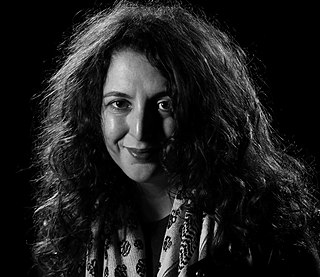Related Research Articles

The history of the cinema of Morocco dates back to "The Moroccan Goatherd" by Louis Lumière in 1897. During the French protectorate, films were produced and directed by French filmmakers, and in 1952, Orson Welles directed his Othello in the historic city of Essaouira. Since independence in 1956, Moroccan film directors developed the national film industry. Emergence in the 1970s met with growing international success.
Ali Essafi is a Moroccan film director, screenwriter, film producer, and cinematographer.
Mostafa Derkaoui is a Moroccan film director and screenwriter who has made revolutionary and socially-engaged films.

Mohamed Abdelkrim Derkaoui is a Moroccan director and producer.
Anas Basbousi known artistically as Bawss, is a Moroccan actor and rapper. He is best known for his role in Nabil Ayouch's 2021 film Casablanca Beats, which was selected to compete for the Palme d'Or at the 2021 Cannes Film Festival.

Said Khallaf is a Moroccan screenwriter and director. He is best known for his 2016 film A Mile in My Shoes.
Saâd Chraïbi is a Moroccan director and screenwriter.
Alaa Eddine Aljem, is a Moroccan director and screenwriter.
Les griffes du passé is a 2014 film directed by Abdelkrim Derkaoui. The film is inspired by two real events. The first is that of Amina Filali who committed suicide after being forced to marry her rapist. The second is that of a woman who was raped and then sentenced to seven years in prison after mutilating her rapist's genitals.
Abdou Achouba is a Moroccan-Italian filmmaker, journalist, film critic and producer. He has presided over the jury of short films at the Moroccan National Film Festival. He studied political science, then cinema at the IDHEC in Paris.
The International Women's Film Festival of Salé or FIFFS, is a film festival held in Salé, Morocco.
Bachir Skiredj was a Moroccan actor, filmmaker, comedian, and screenwriter. A popular entertainer for decades, he was best known for his role in Mohamed Abderrahman Tazi's À la recherche du mari de ma femme, a box office success.

Amina Rachid was a Moroccan actress.
Fatima Regragui was a Moroccan actress.
Fatima Boubekdi is a Moroccan filmmaker.
SofiaAlaoui is a French-Moroccan director and screenwriter. She is best known for her short film Qu'importe si les bêtes meurent.
Selma Bargach is a Moroccan filmmaker.

Autumn of Apple Trees is a 2020 Moroccan film directed by Mohamed Mouftakir. The film opened the National Film Festival in Tangier and was screened at the Cairo International Film Festival.

Sonia Terrab is a Moroccan writer, filmmaker, and activist. Her work revolves around the status of women in Moroccan society, social hypocrisy regarding the body and sexuality, and Moroccan youth.
Hamid Najah (1949—2024) was a Moroccan theater and film actor, set designer, poet, and artist.
References
- ↑ "About Some Meaningless Events". The New Yorker. Retrieved 2021-11-15.
- ↑ Dardar, Jihad. "Banned Moroccan Movie 'About Some Meaningless Events' Is Streaming Again". Archived from the original on 2021-01-21. Retrieved 2021-11-15.
- ↑ "ARDECHE IMAGES - About Some Meaningless Events". lussasdoc.org. Retrieved 2021-11-15.
- ↑ "De quelques événements sans signification". jcdh.armcdh.ma. Retrieved 2021-11-15.
- ↑ "De quelques évènements sans signification, Mostafa Derkaoui - Débordements". www.debordements.fr. Retrieved 2021-11-15.
- 1 2 "About Some Meaningless Events (أحداث بلا دلالة)". Festival International du Film de Marrakech. Retrieved 2021-11-15.
- ↑ Fafner, Hans Henrik (2019-11-19). "Meaningless events with a lot of meaning". MODERN TIMES REVIEW. Retrieved 2021-11-15.
- ↑ "DE QUELQUES ÉVÉNEMENTS SANS SIGNIFICATION | Il Cinema Ritrovato Festival" . Retrieved 2021-11-15.
- ↑ ""De quelques événements sans signification" : Mostafa Derkaoui face à son œuvre". Telquel.ma (in French). Retrieved 2021-11-15.
- ↑ "Jeudis cinéma droits humains : Projection "De quelques événements sans signification" de Moustafa Derkaoui". Aujourd'hui le Maroc (in French). Retrieved 2021-11-15.
- ↑ Firdaous, Kawtar (2021-07-26). ""Quelques événements sans signification" de Mustapha Derkaoui enfin projeté au Maroc". LobservateurDuMaroc (in French). Retrieved 2021-11-15.
- ↑ "ABOUT SOME MEANINGLESS EVENTS". FIDMarseille. Retrieved 2021-11-15.
- ↑ "De quelques événements sans signification (About Some Meaningless Events) by Mostafa Derkaoui". frenchculture.org. Retrieved 2021-11-15.
- ↑ "MoMA Presents: Mostafa Derkaoui's About Some Meaningless Events | MoMA". The Museum of Modern Art. Retrieved 2021-11-15.
- ↑ ""De quelques évènements sans signification" de Derkaoui sera projeté à la Berlinale 45 ans après sa censure". Telquel.ma (in French). Retrieved 2021-11-15.
- ↑ "About Some Meaningless Events review – attempted murder and the movies". the Guardian. 2021-01-18. Retrieved 2021-11-15.
- ↑ "About Some Meaningless Events". Archived from the original on 2021-11-15.